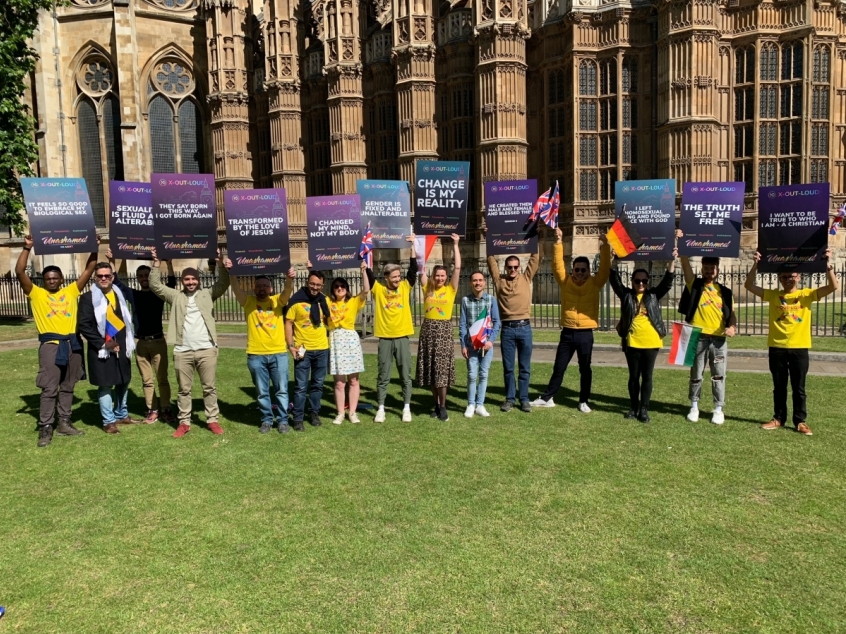
Members of the ex-LGBT community gathered in London over the weekend to share powerful testimonies about how they have been changed by the love of God.
The Unashamed event by X-Outloud, a project of Core Issues Trust, brought together Christians from Europe and the US who used to be LGBT but who are now embracing their God-gien gender and happily seeking opposite-sex relationships, marriage and family.
They shared moving accounts of being healed not only from unwanted same-sex attraction and gender dysphoria, but also from porn addiction, drug abuse and mental health issues like depression and suicidal thoughts.
They included Liam Hayden, from the UK, who said it was professional counselling that allowed him to work through the root causes of his unwanted homosexuality and stop him from taking his own life two years ago.
"Through the counselling and through understanding where the problem came from, I was able to then bring those issues before God and I was then able to receive healing from it and let it go to God ... Today I am here, I'm still living, it hasn't harmed me."
Unashamed was held as UK governments move closer to banning so-called conversion therapy.
Many of the speakers, including Hayden, defended the freedom to seek out help.
"If someone wants to take that away from me, then you might as well have come into my room and pushed me out the window that day," he said.
"If shame was removed by God and through counselling, if my traumas have been healed so greatly, then does this prove that I was harmed, that I was a victim? Or that I am healed and am a victor?"
The UK government has given assurances that the conversion therapy ban will not include prayer, but some campaigners are pushing for this to be included as well.
Peter Benjamin, who spent years of his life dressing and living as a woman, said that it was thanks to his church praying for him that he was able to leave behind cross-dressing and embrace his identity as a man.
"If it wasn't for God and wasn't for Jesus, I wouldn't be here," he said.
"I am crying when I hear about these parents dressing their boys in dresses, and drag queens in schools. It just makes me cry.
"Why aren't the churches awake to this when it's doing serious, serious harm to our children, to families, to people?
"My church prayed for me. When I came back to being Pete, the church was praying for me to come back as Pete and to give up the transgender lifestyle."
Alexandra Lesnik, a former lesbian from Poland, said her same-sex attraction had "destroyed" her and that it was a "brave" psychotherapist who helped her to realise that change was possible.
With the psychotherapist's help, she was able to find freedom from her "unhappy" life as a lesbian.
"It is important to have freedom of speech and that we can speak about things because, yes, there is an LGBT community but, hello, we are also here - the ex-LGBT community," she said.
Mike Davidson, founder of the Core Issues Trust, which offers counselling to people with unwanted same-sex attraction or gender dysphoria, encouraged people to sign a new declaration asking the government to uphold therapeutic choice.
The declaration has been signed by dozens of organisations, including Christian Concern, Voice for Justice UK, Liberty Counsel and the Christian Medical and Dental Associations.
A copy will be sent to every MP in the four nations of the UK.
The document warns that banning conversion therapy is "unsafe" for people experiencing distress about their sexuality or gender identity, and that it will "extend 'cancel culture', silence dissent and inhibit free speech".
It states, "Banning 'conversion therapy' infringes human rights and freedoms, imperilling both therapeutic choice and pastoral, professional and parental rights."
Davidson said the aim of the document was to generate some "level-headed discussion" around the topic of so-called conversion therapy.
"We have given up trying to convince the mental health bodies that we exist because we are told we don't exist, that it is not possible to walk away from feelings that we don't want in our lives," he said.
"We didn't choose the feelings but we have choices around the feelings we experience and that's what's important to us.
"We want to say to the world: we exist."













